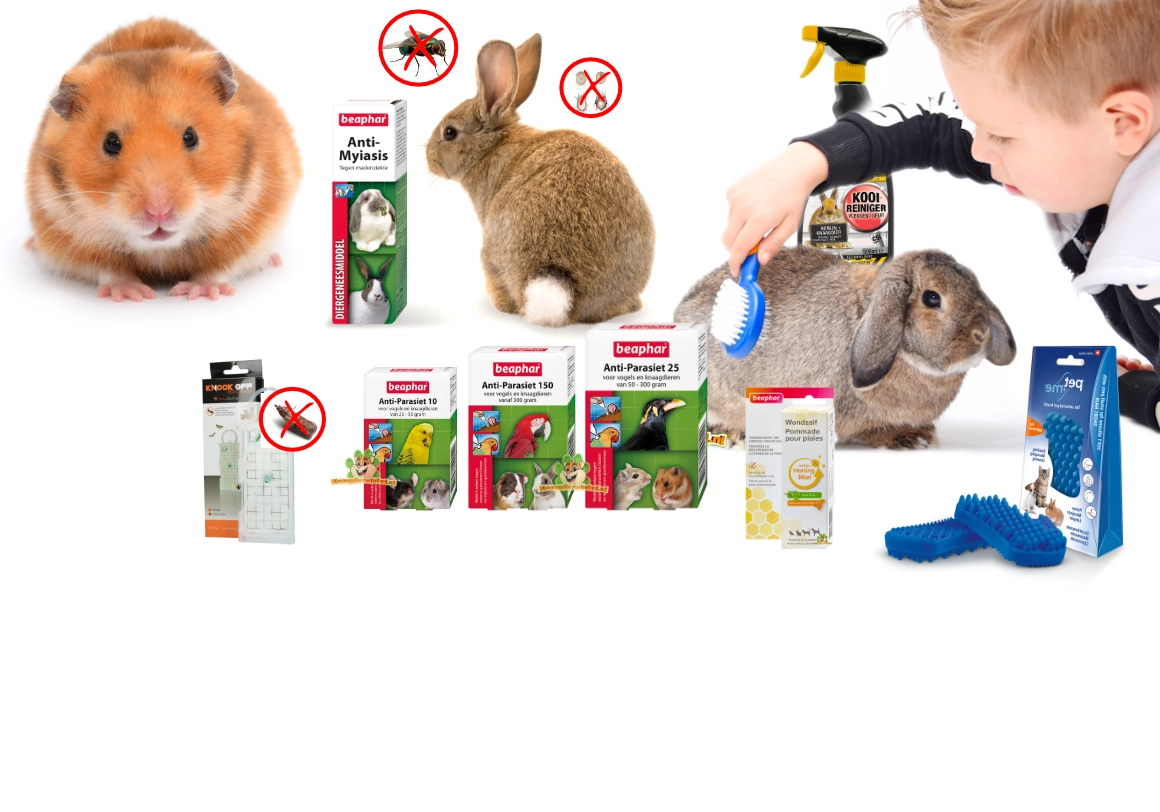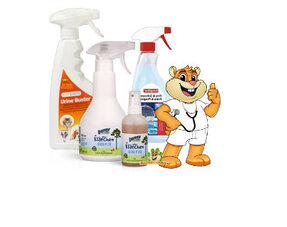Health & Care for Rodents and Rabbits
You can order Health & Care for Rodents and Rabbits quickly and easily at DRD Rodent Shop ®
Good care is the foundation for a fit, comfortable, and happy pet. In this category, you'll find carefully selected products for the health and daily care of rodents and rabbits: from skin and coat care to hygiene, nail care, and targeted support. DRD Rodent Shop® has been a specialist since 2011 – so you're shopping with knowledge and experience tailored to small animals (no one-size-fits-all).
Subcategories Health & Care
Support for daily well-being and recovery moments, with products suitable for rodents and rabbits.
View Health →
Brushes, combs and mild care for moulting, long hair and a neat, healthy coat.
View Skin & Coat →
Solutions for animals and the environment (think of mites/lice and also flies or food moths).
View Parasites →
Targeted support when needed. Guinea pigs always need sufficient vitamin C.
View Vitamins →
Safely clean your enclosure, accessories, and surroundings – for a fresh base and fewer risks.
View Hygienically Clean →
What will you find here?
- Care products for skin, coat and minor ailments (mild and suitable for small animals).
- Parasite and environmental approach (animal and enclosure/environment, where appropriate).
- Vitamins & supplements for targeted support (not just standard "just like that").
- Nail care to prevent snags, crookedness and discomfort.
- Hygiene products for cage, litter tray, shelves and accessories.
For which animals?
- Mice & rats: choose mild products and pay extra attention to irritants (the airways may be sensitive).
- Dwarf hamsters & hamsters: Regular checks of coat, nails, and general condition help identify problems early.
- Gerbils: Good hygiene and appropriate coat care (as per product advice) support their well-being.
- Chinchillas & degus: Coat care requires species-appropriate choices; hygiene in the enclosure remains essential.
- Guinea pigs: make sure they get enough vitamin C (guinea pigs cannot produce this themselves).
- Rabbits: Coat inspection (especially during molting) and nail care are important; outdoor rabbits require extra vigilance for flies and hygiene during warmer periods.
Checklist: how to choose the right care product
- Animal species and life stage: not every product is suitable for every animal (check label/description).
- Purpose: Is it about care, hygiene, or a clear problem that needs to be addressed?
- Take the environment into account: when it comes to pests/parasites, the habitat is often just as important as the animal itself.
- Dosage & use: Follow the label, weigh your pet if necessary, and never use by feel.
- When to take action: if complaints persist, lethargy, not eating/drinking or rapid deterioration: consult a veterinarian .
Practical tips
- Weekly mini-check: coat, skin, eyes/nose, nails and weight (especially with small rodents) provide a lot of information.
- Moulting periods: extra brushing prevents tangles and reduces hair ingestion (especially in rabbits and long-haired guinea pigs).
- Take a smart approach to hygiene: work with fixed cleaning times and tackle wet areas daily.
- New animal or new habitat? Keep a close eye on it during the initial period: stress can affect behavior and resistance.
Hygiene & maintenance
- Daily: remove wet spots, check toilet areas, keep food and water areas clean.
- Periodically: Clean accessories and bases; replace materials that are no longer easy to clean.
- Safe cleaning: choose products intended for (small) pets, rinse where necessary and let everything dry thoroughly.
Safety
- Always read the label: animal species suitability, dosage and application are leading.
- Avoid unnecessary treatment: preventative treatment against parasites is not always necessary; consider the risk and the situation.
- Combinations: do not simply mix products (especially not with sensitive animals).
- In case of doubt or serious complaints: this is always a veterinary situation. Care products support, but do not replace, a diagnosis.
FAQ Health & Care
Should I take preventative treatment against parasites?
Non-standard. Consider the situation (indoors/outdoors, contact with other animals) and only use products specifically designed for your species.
When are vitamins or supplements useful?
Only if there's a clear reason. Guinea pigs always need sufficient vitamin C; for other animals, it's better to give it in a targeted way than "just because."
How often should I cut my nails?
This varies from animal to animal. Check regularly and clip small pieces if possible. If in doubt, have a vet or groomer demonstrate it (once).
Which cleaning is safe for the accommodation?
Use appropriate (pet-safe) cleaning products, rinse where necessary and allow everything to dry thoroughly before returning your pet.








